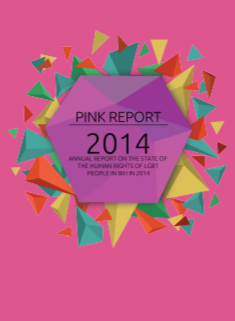Pink Report. Annual Report on the State of the Human Rights of LGBT People in Bosnia and Herzegovina in 2014
Pink Report. Annual Report on the State of the Human Rights of LGBT People in Bosnia and Herzegovina in 2014
Author(s): Emina Bošnjak, Saša Gavrić, Vladana VasićContributor(s): Alison Sluiter (Translator)
Subject(s): Gender Studies, Law, Constitution, Jurisprudence, Media studies, Criminal Law, Human Rights and Humanitarian Law, Evaluation research, Social differentiation, Social Norms / Social Control
Published by: Sarajevo Open Centre
Keywords: BiH; human rights; LGBTI; gender; 2014; annual report; hate crime; judiciary; law; equality; discrimination; criminal acts; asylum; media;
Summary/Abstract: In publishing the Pink Report, the annual report on the state of human rights of LGBT people in Bosnia and Herzegovina in 2014, Sarajevo Open Centre continues with its intensive advocacy work in the field of LGBT rights. The Pink Report is the only one of its kind in BiH dedicated exclusively to covering the human rights of LGBT individuals. It is being published for the fourth year in a row. When we speak about the rights of LGBT people, we can conclude that the following important events occurred in 2014: - Political stagnation, caused by the election campaign, post-election negotiations, and political instability have brought about a situation in which, from the spring until the end of 2014, it was impossible to implement any relevant advocacy initiatives, particularly where the amending of legislation or adoption of strategic documents were concerned; - The election campaign, political parties’ programs, and the processes in parliaments and governments have shown that the rights of LGBT people are politically irrelevant. Not a single party recognized this as a relevant problem, and no solutions were offered. Until this point, there has not been a single discussion about the rights of LGBT people at any governmental or parliamentary session; - The Federation of BiH was not able to change the FBiH Criminal Code, despite the fact that there were two initiatives in the parliament. The Criminal Code should be amended to incorporate provisions related to the criminal offenses of hate crimes and hate speech; - Strategic documents that would have recognized the state of the rights of LGBT people and offer solutions and measures for the improvement of the rights of LGBT people were not adopted. The Institution of Human Rights Ombudsman of BiH failed to draft a special report on the state of the rights of LGBT people. No other national documents, such as a strategy on combatting discrimination or a strategy for improving the rights of LGBT people were never even discussed. - Activism for the rights of LGBT people flourished. In addition to the existing initiatives and organizations (for example, Q Sport or Okvir Association), which intensified their work, a number of new activist nuclei were formed. A Banja Lukabased association of queer activists was registered in 2014, and implemented a number of campaigns and carried out various activities. The Association LibertaMo is currently in the process of registration in Mostar, and the informal TANKA initiative is active in Tuzla; - In comparison to 2013, violence against LGBT people increased. LGBT individuals, as well as LGBT activists, became the targets of more frequent attacks. However, during 2014, two judgments were delivered that confirmed the violation of the rights of LGBT people. A judgment of the Constitutional Court of BiH confirmed that the right to gather in public was violated in the case of the Queer Sarajevo Festival. This is the first decision of the Constitutional Court dealing with the rights of LGBT individuals in BiH. Despite the articulated efforts and calls for concrete actions of civil society and international community, BH authorities remain ignorant of the needs of a large segment of its population. At the moment there are no indications that this attitude of BH authorities will change, all the while homophobia and transphobia remain a common experience in the governmental institutions. In order to improve the rights of LGBT people, Sarajevo Open Centre is proposing three priority measures to be taken by the competent institutions this year.
Journal: ROZI IZVJEŠTAJ
- Issue Year: 2014
- Issue No: *
- Page Range: 1-32
- Page Count: 32
- Language: English

